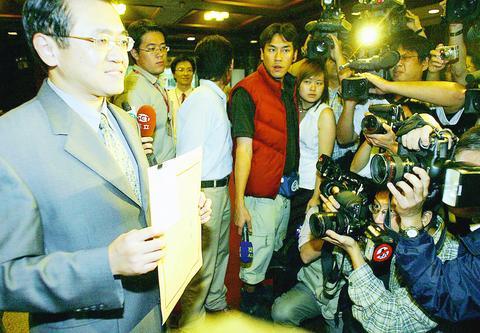The Presidential Office yesterday officially requested the Legislative Yuan to allow President Chen Shui-bian (
Legislative Speaker Wang Jin-pyng (王金平) promised to convene cross-party negotiations by Thurs-day to discuss what would be the first-ever "state-of-the-nation" report.

PHOTO: CNA
"In order to strengthen national security, maintain democracy and freedom, facilitate national progress and development and seek support from both ruling and opposition parties on major national policies, [the president] expects to deliver the special report on three important issues -- the arms procurement budget, the nation's bid to enter the UN and peaceful cross-strait development," the message said.
It was delivered to the Legislative Yuan by Presidential Office First Bureau Chief Leonard Chao (
The message said the request was in accordance with the Fourth Additional Article in the Constitution, which says that the Legislative Yuan can invite the president to make a "state-of-the-nation" address every year.
"We hereby request that the Legislative Yuan arrange for the state-of-the-nation address to be delivered as soon as possible," the message said.
Chen announced his decision to directly communicate with opposition legislators on the arms deal during an address at the Democratic Progressive Party's (DPP) extraordinary national congress on Sunday.
Opposition parties responded yesterday by saying that they wanted a question-and-answer session between legislators and the president to immediately follow the report, while the DPP insisted that this would spoil the spirit of the Constitution and cause a constitutional crisis.
"Chen says that he is willing to further interact with legislators after delivering the special report," Presidential Office Deputy Secretary-General Cho Jung-tai (卓榮泰) said. "The president will respect the Legislative Yuan's decision on how the state-of-the-nation address will proceed because the president expects that the processes will not be `one-way' communication."
The Fourth Additional Article does not state that legislators can demand a question-and-answer session with the president.
Cho's remarks hinted that Chen may stay at the Legislative Yuan to listen to the legislators' suggestions and offer a summary response.
Meanwhile, Wang said that because legislative agendas and budget allocations had already been set, it would be difficult to allow the president to deliver a report before December's legislative elections. But the final decision could be arrived at after negotiations, he said.
Wang indicated that, according to the spirit of the Additional Articles, the right to determine whether the president will report to the Legislative Yuan lies solely with the legislature.
Now that Chen had taken the initiative, and out of respect for the president, Wang said he would convene cross-party negotiations after receiving the request.
On the viability of a question-and-answer session following the president's report, Wang said that if Chen were to come to the Legislative Yuan, he should interact with its members and provide explanations if legislative members have questions.
"Otherwise, how would it differ from making an announcement on television?" Wang said.
Wang also said that there should be no limit placed on topics.

ENDEAVOR MANTA: The ship is programmed to automatically return to its designated home port and would self-destruct if seized by another party The Endeavor Manta, Taiwan’s first military-specification uncrewed surface vehicle (USV) tailor-made to operate in the Taiwan Strait in a bid to bolster the nation’s asymmetric combat capabilities made its first appearance at Kaohsiung’s Singda Harbor yesterday. Taking inspiration from Ukraine’s navy, which is using USVs to force Russia’s Black Sea fleet to take shelter within its own ports, CSBC Taiwan (台灣國際造船) established a research and development unit on USVs last year, CSBC chairman Huang Cheng-hung (黃正弘) said. With the exception of the satellite guidance system and the outboard motors — which were purchased from foreign companies that were not affiliated with Chinese-funded

PERMIT REVOKED: The influencer at a news conference said the National Immigration Agency was infringing on human rights and persecuting Chinese spouses Chinese influencer “Yaya in Taiwan” (亞亞在台灣) yesterday evening voluntarily left Taiwan, despite saying yesterday morning that she had “no intention” of leaving after her residence permit was revoked over her comments on Taiwan being “unified” with China by military force. The Ministry of the Interior yesterday had said that it could forcibly deport the influencer at midnight, but was considering taking a more flexible approach and beginning procedures this morning. The influencer, whose given name is Liu Zhenya (劉振亞), departed on a 8:45pm flight from Taipei International Airport (Songshan airport) to Fuzhou, China. Liu held a news conference at the airport at 7pm,

AIR SUPPORT: The Ministry of National Defense thanked the US for the delivery, adding that it was an indicator of the White House’s commitment to the Taiwan Relations Act Deputy Minister of National Defense Po Horng-huei (柏鴻輝) and Representative to the US Alexander Yui on Friday attended a delivery ceremony for the first of Taiwan’s long-awaited 66 F-16C/D Block 70 jets at a Lockheed Martin Corp factory in Greenville, South Carolina. “We are so proud to be the global home of the F-16 and to support Taiwan’s air defense capabilities,” US Representative William Timmons wrote on X, alongside a photograph of Taiwanese and US officials at the event. The F-16C/D Block 70 jets Taiwan ordered have the same capabilities as aircraft that had been upgraded to F-16Vs. The batch of Lockheed Martin

GRIDLOCK: The National Fire Agency’s Special Search and Rescue team is on standby to travel to the countries to help out with the rescue effort A powerful earthquake rocked Myanmar and neighboring Thailand yesterday, killing at least three people in Bangkok and burying dozens when a high-rise building under construction collapsed. Footage shared on social media from Myanmar’s second-largest city showed widespread destruction, raising fears that many were trapped under the rubble or killed. The magnitude 7.7 earthquake, with an epicenter near Mandalay in Myanmar, struck at midday and was followed by a strong magnitude 6.4 aftershock. The extent of death, injury and destruction — especially in Myanmar, which is embroiled in a civil war and where information is tightly controlled at the best of times —